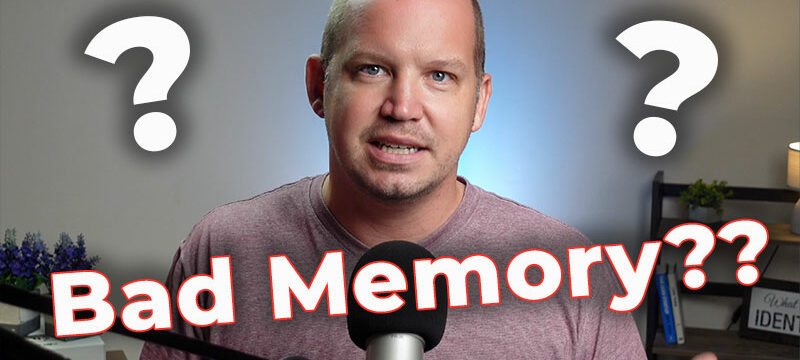No, you don’t have a bad memory! And yes, I want you to know that you can memorize more of the Bible than you currently think is possible. Part of it has to do with your mentality, but it also matters how you approach Scripture memorization.
Follow along with all the Bible Memory Goal YouTube videos!
It’s tempting to think that anybody who has memorized entire books of the Bible must be a memory master (or those who have memorized the whole Bible!), especially when you forgot where you put your keys this morning and you can’t ever remember your neighbor’s name. You just keep saying things like “Hey there!” or “How’s it going man” since it’s too late to ask their name again.
I get it. But you need to hear me clearly. You don’t have a bad memory. You’re just out of practice.
You don’t have a bad memory, you’re just out of practice.
You Can’t Just Run a Marathon
Consider this: a while back, I set a goal to run a marathon. When I set the goal, I could barely run 2 miles without being completely exhausted. But I set the goal, signed up for the marathon, and I trained.
Every day I ran a little bit. Some days were more, some days were less, but I forced myself into the habit of always running. And the more I trained, the stronger my muscles and my lungs got until eventually I ran and finished the Nashville Music City Marathon.
Our brain is a muscle. Without exercise, it becomes weak, and right now that might be exactly how you feel right now.
But it’s not that you have a bad memory.
I’m repeating this again because often the biggest obstacle you need to overcome is…YOU. If you tell yourself that you can’t memorize the Bible or you tell yourself that it will simply take too much time, it will become a self-fulfilling prophesy.
God did not tell us in the book of Colossians to “…let the Word of Christ dwell in you richly”, but then give you a brain that couldn’t do what He asked.
How could Jesus be an example of somebody who lives on “…every word that comes from the mouth of God”, if He did not also give us the ability to live in that way like Him?
Step 1: Change Your Attitude
So the first step here is to ask God to change your attitude toward yourself and your memory. Why not even makes this part of your prayer each day?
It might not be an automatic change, but as Paul says at the end of 1 Thessalonians: “The one who calls you is faithful, and he will do it!”
Step 2: Remember How Exercise Works
The second step is to remember how exercise works.
You don’t go from running 1 mile or 1 kilometer to suddenly running 26 miles or 42 kilometers. Likewise, you don’t go from having never memorized anything to suddenly memorizing large sections of scripture.
It starts with just one verse.
That could be one verse a week to start and then maybe two verses a week. As Pastor Scott Stonehouse explained, building Bible memory habits starts with small steps.
Right now the thought of memorizing one verse a day may seem overwhelming and entirely impossible – and that might be true, right now – but trust me when I say that after a couple months of memorizing one to two verses a week, it begins to seem more and more possible.
Step 3: Enjoy the Memorization Journey
I would also encourage you to enjoy the journey and not fixate on the goal.
This, if I’m being honest, has been incredibly hard for me right now as I have this admittedly ambitious goal of memorizing the whole New Testament in the next two years. If I focus too much on that end goal, I tend to lose the joy of this journey of memorization.
And here’s a simple truth that I have to remind myself, especially when I get discouraged in my memorization of the Bible: our brains are wired to not only want do the things we enjoy, but because of that, to do them better.
You did better at certain subjects at school not just because you had more aptitude toward that particular subject, but more likely because you enjoyed it. The joy you received from studying it actually increased your ability to perform well.
In the same way, if you can find joy in the memorization of Scripture, you’re much more likely to do it well and to do more of it.
How can you do that?
Well I’d start by suggesting that you should memorize a part of Scripture that you really like. A passage or book of the Bible that has meaning to you. I’ve already talked about choosing which book of the Bible to memorize, and maybe you can watch that next.
Also, if you get stuck somewhere or get discouraged, change things up a bit and make it fun! Start a new passage of scripture or give yourself a quick win by memorizing a short Psalm. Don’t feel like you must complete a certain goal at a certain time, because if you’re not enjoying the journey and learning from it, what’s the value?
Step 4: Change it Up and Make it Fun!
And along those same lines, my final point is this: memory doesn’t have to be rote.
If you’ve watched any of my other videos on this channel you’ll know that I’m not a huge fan of rote memory. Rote memory, which is the process of repeating something ad nausea until you’ve dug a trench so deep in your mind that you can’t forget it, is exhausting.
The problem is that this is most often the only way that Bible memory is taught. But there’s a good chance your capacity to memorize would explode if you try a different method. You could sing scripture. You could use what are known as mnemonics. You could do what I do and use a combination of a memory palace for Scripture memory and story encoding.
More Ideas & Methods for Bible Memory
If you want more ideas on different memory tactics that you could use to memorize the Bible, head over to BibleMemoryGoal.com/methods and I’ll send you a series of emails that will give you a head start. It’s absolutely free and you can unsubscribe anytime.
Be encouraged! As it says in Romans 12, you can be transformed by the renewing of your mind. Then you will be able to test and approve what God’s will is – his good, pleasing and perfect will.”



I have been so disappointed that I just accepted something must be wrong with my brain that wouldn’t allow me to memorize scriptures. I’ve always struggled in general with memorizing. Reading this has given me hope. I’m 67 and going to take your advice and give it another try. Thank you.